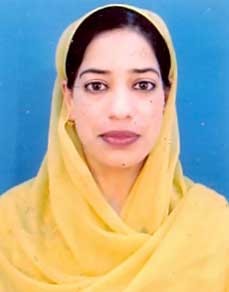A small girl from a little known village in north Kashmir used to walk long distances on foot to reach her school. She had a dream, and a passion to make it a reality. Her hardship has finally paid off and made her a role model for the women in Kashmir, SAMEER YASIR reports.

Shazia Tabusum was crossing a waterlogged street of Wagoora in a remote village in north Kashmir when she decided that she wanted to be a lawyer. She was in her school then. Throughout her life, she travelled on foot to reach the bus station, which was many miles away from her village, to take a bus to Baramulla where her school was situated.
Wagoora used to be, and still is, an underdeveloped area, even by the Kashmiri standards. It is a picturesque village situated in the lap of the mighty Baramulla mountains. For any student of this village, going to school meant tremendous hardships. There was no transport available till recently, and roads were almost non-existent.
Shazia was among the nine advocates who were recently appointed as District and Sessions Judges under direct quota. Among the nine people selected, five were from Kashmir and four from Jammu. What makes Shazia different from others was her unshakable commitment to pursue her dreams, despite innumerable hardships. That she was even able to translate her dreams into a reality is something which is still difficult for women to achieve in a patriarchal society like Kashmir.“The journey was difficult, but it was worth a fight. The passion for judiciary made me work hard and it has paid off,” she says.
Last year, around 215 candidates appeared in Higher Judiciary (Direct Recruitment) examination conducted by the state High Court. Though 13 posts were desired to be filled up and 15 candidates were shortlisted for interview, only nine candidates were declared as successful. Shazia says the efforts put by her parents enabled her to pass the exams.
Daughter of a retired teacher, she did her schooling from the prestigious St Josephs School in Baramulla. She then went on to complete her B Sc in Government Degree College Baramulla. After completing her bachelors, she entered the Kashmir University’s Law department where she did her LLB in 2001.
“Whatever I am today, I attribute this to my teachers. It is because of their hard work and efforts. They had a belief in me that I can do things.” Shazia told Kashmir Life. She says her teacher and the-then head of the department of Law, Abdul Salam Bhat, played an important role in shaping her attitude towards life and studies.
“Mr Bhat always used to peep through window to see who was doing what. He would never allow us to waste our time. When I entered into the real world, I realized the importance of spoken word of my teachers,” she says.
After completing her LLB, she started practicing in district court, Baramulla in 2001. “I did appear for KCS judicial but could not figure in the final selection list after qualifying for the interview. But I never lost the hope. Many colleagues would tell me that I was better as a practicing lawyer but I knew I had to do it,” she recalls.
The newly appointed judge by the J&K High Court attributes her success to “hard work, professional experience and support extended to them by parents, family members and well wishers.” The High Court had not advertised the post from 2001 to 2008 for the district judges. When the post was advertised, she applied but failed to make it to the list in 2009.
Although, she says, there were certain things which make a woman work harder than a man, but still a lot has changed in the field of judiciary. There is no gender discrimination in the courts. “You are either a good or a bad lawyer.”
The responsibility, she says, now is bigger than that of a lawyer. “When you are sitting on that chair, you have to be balanced and look at the arguments made by both sides so that the dispensation of justice is proper. Ultimately we have to justify whole judgment.”
When asked about the rise in domestic violence and cases dragging in courts for long times, she also feels that the justice gets delayed but, she says, there are various reasons for the delay. “Even a single strike can be reason for the prolonged delay of a case.”
Shazia is not married. She says her first priority was to achieve her goal and make her parents happy. “Marriage was never a priority for me.” According to her, societies are valued on the basis of their gender sensitivity. Judiciary in Kashmir has been one of the institutions in Kashmir which has been fair towards the women. There are women judges like Kaneesa Fatima, Umi Kulsoom and many others who have really made an impact on the society.
“Most of these women judges have been role models for many of the aspiring women judges, which includes me as well. They have broken the traditional barriers. That is what every woman should think of.”















